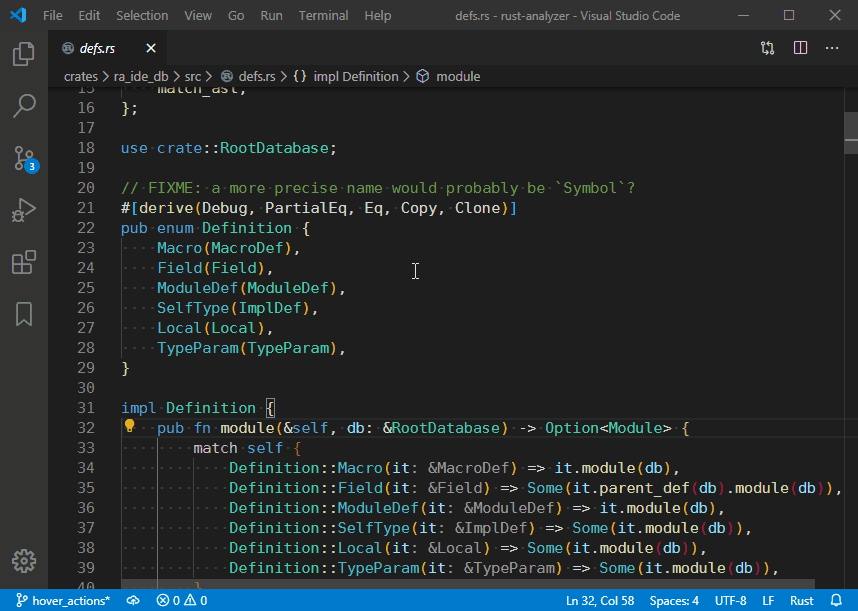4729: Hover actions r=matklad a=vsrs
This PR adds a `hoverActions` LSP extension and a `Go to Implementations` action as an example:

4748: Add an `ImportMap` and use it to resolve item paths in `find_path` r=matklad a=jonas-schievink
Removes the "go faster" queries I added in https://github.com/rust-analyzer/rust-analyzer/pull/4501 and https://github.com/rust-analyzer/rust-analyzer/pull/4506. I've checked this PR on the rustc code base and the assists are still fast.
This should fix https://github.com/rust-analyzer/rust-analyzer/issues/4515.
Note that this does introduce a change in behavior: We now always refer to items defined in external crates using paths through the external crate. Previously we could also use a local path (if for example the extern crate was reexported locally), as seen in the changed test. If that is undesired I can fix that, but the test didn't say why the previous behavior would be preferable.
Co-authored-by: vsrs <vit@conrlab.com>
Co-authored-by: Jonas Schievink <jonasschievink@gmail.com>
Co-authored-by: Jonas Schievink <jonas.schievink@ferrous-systems.com>
4740: Remove unneeded "./" prefix affecting error messages r=kjeremy a=dtolnay
I noticed this in the error in the commit message of https://github.com/rust-analyzer/rust-analyzer/pull/4739.
Before:
```console
error[E0599]: no method named `initialize_finish` found for struct `lsp_server::Connection` in the current scope
--> crates/rust-analyzer/./src/bin/main.rs:99:16
|
99 | connection.initialize_finish(initialize_id, initialize_result)?;
| ^^^^^^^^^^^^^^^^^ method not found in `lsp_server::Connection`
```
After:
```console
error[E0599]: no method named `initialize_finish` found for struct `lsp_server::Connection` in the current scope
--> crates/rust-analyzer/src/bin/main.rs:99:16
|
99 | connection.initialize_finish(initialize_id, initialize_result)?;
| ^^^^^^^^^^^^^^^^^ method not found in `lsp_server::Connection`
```
```diff
- --> crates/rust-analyzer/./src/bin/main.rs:99:16
+ --> crates/rust-analyzer/src/bin/main.rs:99:16
```
Co-authored-by: David Tolnay <dtolnay@gmail.com>
Before:
error[E0599]: no method named `initialize_finish` found for struct `lsp_server::Connection` in the current scope
--> crates/rust-analyzer/./src/bin/main.rs:99:16
|
99 | connection.initialize_finish(initialize_id, initialize_result)?;
| ^^^^^^^^^^^^^^^^^ method not found in `lsp_server::Connection`
After:
error[E0599]: no method named `initialize_finish` found for struct `lsp_server::Connection` in the current scope
--> crates/rust-analyzer/src/bin/main.rs:99:16
|
99 | connection.initialize_finish(initialize_id, initialize_result)?;
| ^^^^^^^^^^^^^^^^^ method not found in `lsp_server::Connection`
My codebase already depended on lsp-server and introducing a dependency
on rust-analyzer failed at first because it assumes some functions that
were first present in lsp-server 0.3.2.
Without this change:
error[E0599]: no method named `initialize_start` found for struct `lsp_server::Connection` in the current scope
--> crates/rust-analyzer/./src/bin/main.rs:83:57
|
83 | let (initialize_id, initialize_params) = connection.initialize_start()?;
| ^^^^^^^^^^^^^^^^ method not found in `lsp_server::Connection`
error[E0599]: no method named `initialize_finish` found for struct `lsp_server::Connection` in the current scope
--> crates/rust-analyzer/./src/bin/main.rs:99:16
|
99 | connection.initialize_finish(initialize_id, initialize_result)?;
| ^^^^^^^^^^^^^^^^^ method not found in `lsp_server::Connection`
Eventually, we should support "just open random rust file" use case,
we don't really do this now, so let's avoid spending time on it until
we fix it properly.
As per matklad, we now pass the responsibility for finding the binary to the frontend.
Also, added caching for finding the binary path to reduce
the amount of filesystem interactions.
The line separator is moved below the function signature to split
regions between the docs. This is very similar to how IntelliJ
displays tooltips. Adding an additional separator between the module
name and function signature currently has rendering issues.
Fixes#4594
Alternative to #4615
4602: Add boolean literal semantic token type to package.json r=matklad a=lnicola
Closes#4583.
CC @GrayJack
4603: Add self keyword semantic token type r=matklad a=lnicola
Not sure if this is warranted a new token type or just a modifier.
---
CC #4583, @GrayJack
Co-authored-by: Laurențiu Nicola <lnicola@dend.ro>